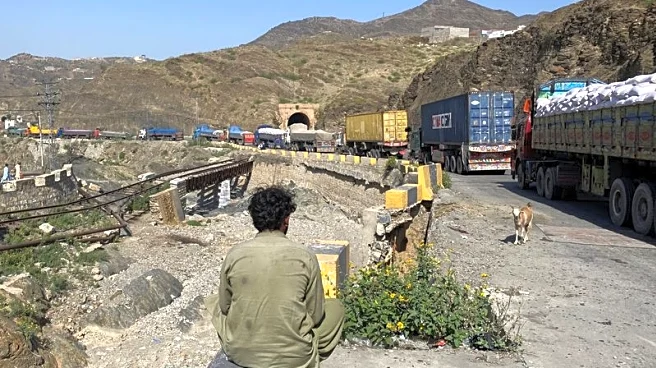By Saeed Shah
ISLAMABAD (Reuters) -Border clashes over the weekend between Afghanistan and Pakistan led to the deaths of dozens of soldiers, the most serious clash between the two countries since the Taliban seized power in Kabul in 2021, and gained the attention of U.S. President Donald Trump. By Monday, the exchange of fire had ceased.
WHAT HAPPENED?
Late on Saturday, Taliban forces attacked Pakistani military posts along the length of the 2,600 km (1,600 miles) border, with Pakistani forces later
retaliating. Guns, artillery and drones exchanged fire into the early hours of Sunday. Some sporadic fighting continued on Sunday. Pakistan said 23 of its soldiers died and the Taliban said nine of its men were killed, though both sides claimed to have inflicted far higher damage on the other.
WHAT CAUSED THE FIGHTING?
Pakistan carried out an air strike on the Afghan capital of Kabul last week, which targeted the head of the Pakistani Taliban militant group, according to Pakistani security officials. It is not clear if he survived. The Taliban said its Saturday attack was in response to the violation of Afghan airspace.
WHO ARE THE PAKISTANI TALIBAN?
In 2007, a number of jihadist outfits active in northwest Pakistan from the Pashtun ethnic group formed Tehreek-e-Taliban Pakistan (TTP), which is commonly known as the Pakistani Taliban. The group was modelled on the Afghan Taliban, an ethnic Pashtun outfit that in the 1990s conquered Afghanistan - before being ousted by a U.S.-led invasion in 2001. But the TTP was more radical, taking its ideology from al Qaeda.
Over the next few years, the TTP attacked markets, mosques, airports, military bases, police stations and also gained territory - mostly along the border with Afghanistan, but also deep inside Pakistan, including the Swat Valley, where they later shot schoolgirl Malala Yousafzai.
They also fought alongside the Afghan Taliban in Afghanistan and hosted Afghan fighters in Pakistan, forming a close bond. Pakistan launched a series of military operations against the TTP on its own soil, with limited success.
In 2014, the TTP attacked a school in the northwest city of Peshawar, killing more than 130 children. That triggered a further military offensive, which largely pushed the group into Afghanistan.
WHAT HAPPENED AFTER THE TALIBAN TOOK AFGHANISTAN?
Pakistan welcomed the return to power of the Taliban in 2021, with then Prime Minister Imran Khan, saying that Afghans had "broken the shackles of slavery". But Islamabad soon found that the Taliban's loyalties lay elsewhere. There has since been a sharp increase in attacks by the TTP in Pakistan.
Islamabad says that the TTP's leadership and many of its fighters are based in Afghanistan. Pakistan has repeatedly called on the Taliban administration to rein in the TTP, but Kabul says that the group does not have a presence in the country.
Islamabad has been accused of supporting the two-decade Taliban insurgency in Afghanistan against the U.S.-backed government - which it denies - but any influence over the group has collapsed. Now, Islamabad says its patience has run out.
WHY IS PAKISTAN ALSO ACCUSING INDIA?
Islamabad says India, its longstanding adversary, is working with Afghanistan to support the TTP and other militants against Pakistan. New Delhi denies the claim. Afghan Foreign Minister Amir Khan Muttaqi is currently on a multi-day trip to India, during which New Delhi upgraded relations between the two nations, raising further concerns in Pakistan.
WHAT HAS TRUMP SAID?
"I hear there's a war now going on between Pakistan and Afghanistan," Trump said Sunday, as he flew to the Middle East. "I'll have to wait till I get back. You know, I'm doing another one, because I'm good at solving wars."
(reporting by Saeed Shah; writing by Saeed Shah; Editing by Thomas Derpinghaus)

















